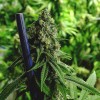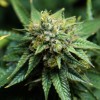Learn the ABCs of THC and CBD and know your grow to the letter
If you’re not planning on growing your own crop, understanding the differences between these two distinct cannabinoids is important. Even if you’re just a consumer. There’s so much information available on the two substances that it can be a nightmare separating truth from fiction.
A natural curiosity to what you’re probably already consuming is normal. Surprisingly, they affect the body in very different ways, and both produce their own individual and unique effects. Perhaps more surprisingly still, they have an identical chemical makeup. Both are making waves in consumption, holistics, legislation, medical science, and even nutrition. So it’s best to know, before you blow.
CBD vs. THC: The Science
As previously stated, CBD and THC have the exact same chemical composition. They each contain 21 carbon, 30 hydrogen, and two oxygen atoms. What makes them different is how these atoms are arranged. Which means that the main chemical difference between the two rests on a single, miniscule, carbon atom. The arrangement of molecules that interact with our bodies are similar to the cut of a key. One tiny difference changes the whole structure and function of the key.
Both Cannabidol (CBD) and Tetrahydrocannabinol work in conjunction with the bodies Endocannabinoid System (ECS). This system consists of a network of receptors found throughout our bodies. Think of receptors as the lock to our molecular key. The locks of the ECS only work with cannabinoid keys, such as THC and CBD.
Scientists have found two major types of these receptors, CB1 and CB2. While they both work with cannabinoids, they are found in different areas throughout the body. CB1 receptors are found in parts of the brain that are responsible for things like memory, high cognition, emotion, and motor coordination. CB2 receptors are found throughout the Central Nervous System (CNS) and the immune system. The central nervous system is largely what connects our bodies to our brains, coordinating the functions of the two.
Because THC and CBD have a slightly different structure, they interact with the receptors in unique and different ways. Both CBD and THC bind normally to CB2 receptor. Each key fitting gracefully into the lock. However, CBD does not bond directly with CB1 receptors, where THC does. In fact, just the mere presence of CBD can keep THC from bonding with CB1, or remove the THC from the ECS lock if it bonded before CBD showed up.
With THC binding to CB1 receptors in the brain, scientists believe that this is why THC gets you high. Where CBD has no psychoactive effects at all, and can even serve to neutralize the high that THC produces.
CBD vs. THC: The Uses
The specific ways in which CBD and THC bond (or don’t bond) with our endocannabinoid system is how and why cannabinoids can be used to positively affect our health, minds, and moods.
Every time a molecular key is inserted into a receptor lock, further chemicals (called neurotransmitters) are released. These chemicals go on throughout the body to perform various functions. Outside of just producing that sought after stoned feeling, THC differs in the types of ameliorative effects that it produces in the body.
THC is used to help with conditions like:
- Pain
- Muscle spasms
- Glaucoma
- Insomnia
- Low appetite
- Lethargy
- Nausea
- Anxiety
- Depression
THC has long been used for nausea and pain, specifically in conjunction with chemotherapy treatments. However, new evidence is showing some promising future applications that THC may well offer us. THC has been shown to be incredibly useful in not only treating mental dysfunctions, but also being able to study them. In a novel study performed on rats, thanks to the epically helpful effects of THC on anxiety, researchers were able to begin to isolate which part of the brain may be responsible for anxiety.
As CBD doesn’t have any euphoric effects, and generally only binds to the receptors found in the body, it’s functions are generally more helpful with physical ailments.
- Seizures
- Inflammation
- Pain
- Inflammatory Bowel Disease
- Nausea
- Migraines
To be sure, there have been reported cases of CBD helping with mental illnesses like anxiety or schizophrenia, but the results have been mixed at best and researchers are still on the fence about CBDs purported anxiolytic properties. What is perhaps the best researched and most well founded benefit to using CBD medicinally is as an anticonvulsant. Several studies have shown that CBD works well to dampen and deter otherwise hard to control seizure activity.
CBD vs. THC: The Legality
This is where things tend to get a bit dicey. Depending on where you’re at in the world, either, both, or neither THC or CBD may be available to you. The world tends to be at odds as to whether either of these substances has any merit. Perhaps because of its notable psychoactive effects, THC has been banned in most countries around the world.
In the US, it’s still considered illegal at a federal level. CBD tends to exist in a much more neutral zone when it comes to the law. Because it doesn’t have the capacity to produce any drug-like or euphoric effects, CBD is generally considered legal by default. However, this strictly applies to hemp-derived CBD, where as CBD that’s derived from THC cannabis plants is still considered illegal in many countries, including the US and UK. So, while CBD isn’t really legal, but it’s not technically illegal either.
For decades, and perhaps even millennia, CBD and THC were not only legal, but incredibly ubiquitous and widely used throughout the world. Indigenous to Central Asia and the subcontinent, clay pipes coated with sticky THC residue have been found dating back to 8000 BC. The Greek historian Herodotus (who existed around 480 BC) noted that the inhabitants of ancient Scythia would often inhale the vapors of hempseed smoke, for both ritual and recreation. In historic times, CBD and Hemp were used regularly for almost everything. In fact, hemp is thought to be one of the earliest plants to be cultivated. Building materials, clothes, paper- hemp was even used to feed armies and as an important nutritional supplement to early settlers.
So while much of the world doesn’t seem too concerned about CBD, THC is definitely another problem all together. Canada and Uruguay are the only countries in the world where THC is legal at a national level. While many others throughout the world have come to decriminalize THC, it’s still not considered legal. The difference between decriminalization and out and out legality is in the fine print. While decriminalized, it may still be illegal to posses, sell, or produce THC containing crops. If caught, you may not be prosecuted or thrown in jail- but you can definitely be slapped with a hefty fine.
In the US, the federal tides of legality concerning recreational THC use may soon be changing. With more states in the US coming to legalize THC and its associated products, lawmakers are discussing as to whether it should be legalized recreationally at a federal level.
CBD vs. THC: The Side Effects
The side effects of both THC and CBD work fairly similar to the main side effects of any drug- namely, if you’re allergic to it, you shouldn’t take it. Outside of that, CBD has such negligible side effects that it’s suggested the only ones that may occur are the result of CBD interacting with another type of medication that you may be taking. No long term effects have been established from the use of CBD. Few, if any, temporary side effects have been observed either.
Because THC interacts a bit more directly with your brain, the side effects from this cannabinoid are a bit more pronounced. While no fatal side effects have ever been observed, THC can cause short-term discomfort, such as:
- Increased heart rate
- Coordination problems
- Thirst/Dry mouth
- Memory loss
- Decreased reaction time
- Anxiety
- Paranoia
- Red eyes
Despite the fact that none of these side effects are fatal, there is some evidence that suggests that prolonged use can cause some neurological disorders, specifically in adolescents. However, experiments to test this theory have only been studied in rats, and some propose that there must be underlying predilection to the dysfunction in the first place. Researchers suggest that further investigation is required. But, perhaps it’s a good reason to avoid the hard stuff until you’re legally of age.
Recently, a coroner in the US reported the first case of overdose by weed known to the world. Stating that a 39 year-old woman had gone into full respiratory arrest after vaping highly concentrated THC oil. But he might be the only one convinced of this purported side effect, as many other qualified officials remain highly suspect of this diagnosis. Overall, nothing substantial has ever been found that THC or CBD can cause long-term or fatal side effects. So smoke on- provided you’re over the age of 21.





